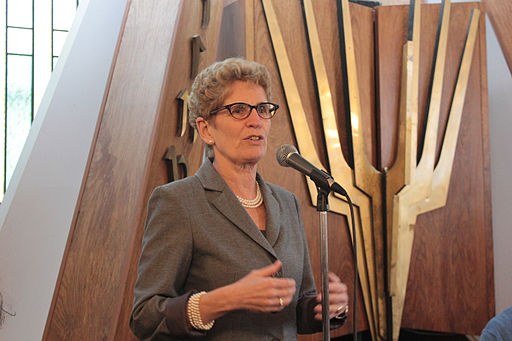


A week after Premier Kathleen Wynne unveiled an updated sex-ed curriculum that would be hitting Ontario schools next fall, the recent changes are still a hot button issue for some voters.
On March 1st, Forum Research released the results of a poll that showed that one half of respondents in their random sample approved of the new curriculum while one third did not. Seventeen per cent had no opinion.
“While it is moderately popular, it doesn’t look like the new Health and Physical Education curriculum is the home run the Premier was hoping it was,” said Lorne Biznoff, President of Forum Research, in a press release. “Where voters may have a problem is the age at which instruction begins. In our sample, voters think about nine or ten years old is appropriate, but many of the elements of this curriculum will be taught before that.”
The last time the curriculum was updated was 1998 and among the latest changes are teaching students about sexual consent, same sex marriages and homosexuality, as well as cyber safety and sexting.
While some took to protesting at Queens Park to voice their concerns or support, others continued the conversation on social media.
“As a teacher, this has my full support. Where else are students going to receive scientifically-accurate, unbiased information about their sexual development?,” says Aviva Hanna,26, in a Facebook comment. “From their parents, who are likely too uncomfortable with their own sexuality (or their children’s for that matter) to educate them? Certainly not from a place of religious worship. We need to decide – if our goal is reduce sexual assaults on campus, homophobia, bigotry, etc., then it needs to start in school and it needs to start early.”
Hanna teaches 1st and 2nd grades in the York Region District School Board.
Misha Biswas, 19, a Brock University Concurrent Education student also commented on Facebook and says the new changes are long overdue.
“Working with children in grade 2 and 3- some of these kids already have phones and when “sexting” is introduced at grade 4 it’s an important topic for them especially as it’s happening earlier and earlier,” says Biswas. “ I think many people are against it because they think with an earlier introduction it’s promoting sex but not all, more so the safety and awareness.”
Not everyone agrees with Hanna and Biswas. Feras Marish and a group of like-minded parents started the Facebook group “Parents Against Ontario Sex-Ed Curriculum” where they discuss their objections to the recent changes and share ongoing media coverage. Marahi has a 2 year-old and a 6 year-old.
“By having a teacher talking to our young kids about their private parts at as young as 6 and starting a sexual conversation, they are normalizing that kind of conversation,” says Marish. “In a way they are grooming them to accept that kind of conversation and even conversations of sexual exploitation. Then there’s no guards against sexual exploitation.”
While Education Minister Liz Sandals assures that the new sex-ed curriculum will stay as is but if a parent objects to any part of it or the curriculum of any other subject, “the Education Act gives a parent of any religion or belief system the right to withdraw their child from that particular lesson.”
Marish says that the ability to pull his child out of class isn’t enough because it will affect the environment in the classroom as a whole. He and his colleagues plan to write to their children’s schools, the Ministry of Education, as well as the Human Rights Commission.






